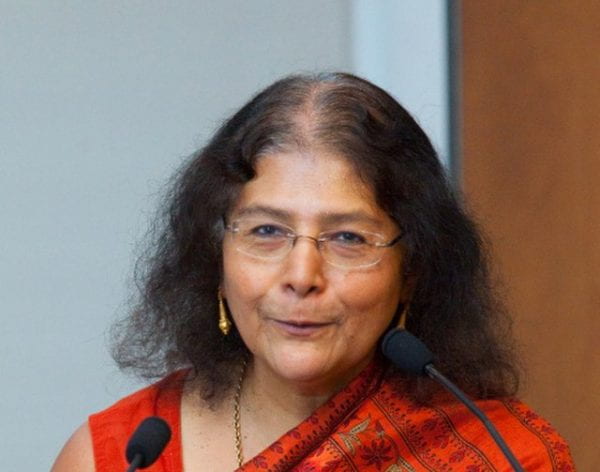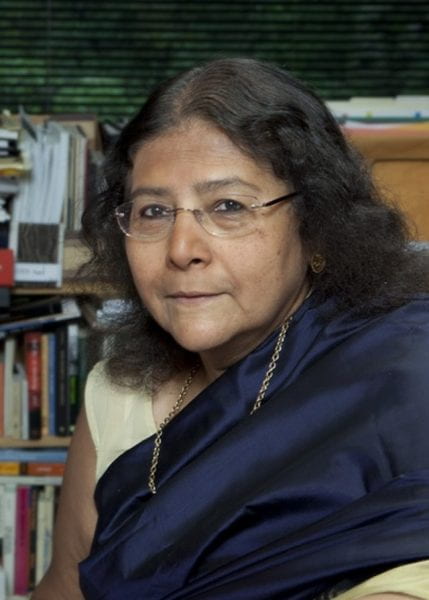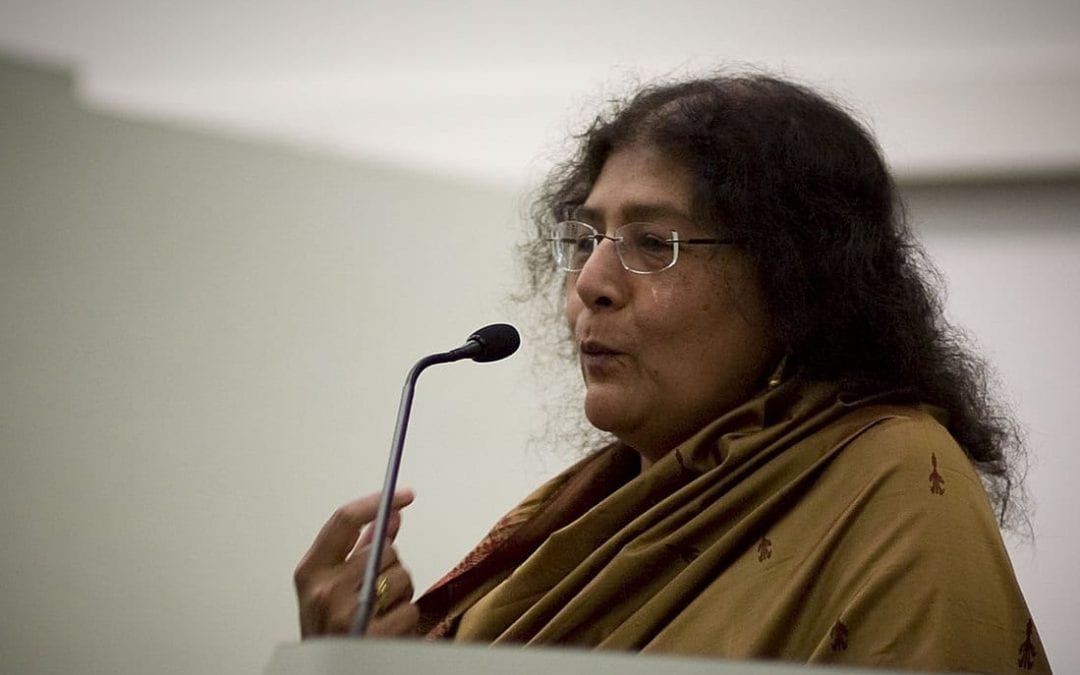Sheila Jasanoff is a foundational figure in the establishment of Science and Technology Studies (STS) from the later half of the twentieth century to present day. According to Jasanoff, STS is the academic discipline that investigates the implications and meanings of living in a world powerfully influenced by science and technology through bringing together two lines of inquiry: examining science and technology as social institutions involved in its own knowledge formation, verification, application, etc.; and analyzing the outward relationships between society, science, and technology. In other words, STS aims to articulate and explore the “relationships between practices within the sciences and the interaction of discovery and invention with other aspects of society.” Imbuing most aspects of her research is the perspective that science is not above or distinct from the society in which it is created. Her administrative, editorial, and pedagogical roles at various global academic institutions has solidified her contributions in defining the field, forming an interdisciplinary framework through which to examine the various relationships science and technology forge in democratic societies. Jasanoff’s scholarship has emphasized the processes of “co-production” of scientific knowledge and social order, introduced concepts such as “sociotechnical imaginaries” and “bioconstitutionalism” into the social sciences and humanities, and produced some of the few studies in all of STS that compare science and technology policy across Western societies. Her works, which also span topics such as law, risk management, environmental decision making, and the comparative politics of regulation, have become basic texts in STS.
Born in Kolkata, India, in 1944, Jasanoff lived in India until her move to the United States in 1956. Due to parental and cultural influences, she pursued undergraduate studies in the sciences, culminating in an A.B. in Mathematics in 1964 at Radcliffe College, the female liberal arts college attached to Harvard College. Her father then encouraged her to pursue a doctorate in chemistry overseas at the University of Bonn. Her plans were modified, however, after her arrival in Germany after she met her now husband, Jay Jasanoff, who introduced her to the field of linguistics—a field in which she would ultimately earn an M.A. from the University of Bonn in 1966 and a Ph.D. from Harvard University after her return to the United States in 1973. Unfortunately, her linguistic expertise did not yield a career as a linguist for her, prompting her to pivot towards law later that year following her enrollment at Harvard Law School. She received her J.D. in 1976.

Sheila Jasanoff at the Chemical Heritage Foundation, Philadelphia, PA, USA. Source: Wikimedia Commons (Public Domain)
Jasanoff joined an environmental law firm in Boston in an era where environmental law was just starting to take off in the United States, the experience later influencing Jasanoff’s future research, which will be explored below. Her life and career took another turn two years later, though, after she followed her husband to Cornell University, where she received a half-time postdoctoral fellowship in the Program on Science, Technology, and Society (STS). She got her first big career push during this time period, as she initially wrote a proposal to conduct a study of the implementation of the Toxic Substances Control Act (TSCA), drawing on her expertise as an environmental lawyer. Due to her legal expertise, aforementioned German language knowledge from her time pursuing her M.A. in Germany, and demonstrated interest in studying chemicals, she was later redirected to work on a collaborative comparative study with two other Cornell STS scholars on the regulation of chemicals in Europe and the U.S.
This resulted in her first published chapter in Controlling Chemicals: The Politics of Regulation in Europe and the U.S. (1985), in which she runs a comparative risk assessment of carcinogenic chemical regulation across the two regions. In her chapter, she demonstrated how the processes of decision-making on the two continents reflected different notions of acceptable evidence and the role of expertise in policy. Controlling Chemicals exposed how different cultures utilize different rhetorical strategies to rationalize or justify decisions based on contested or incomplete knowledge. In addition, her work on Controlling Chemicals demonstrates how unexamined social and cultural biases manifest in policy-making and thereby become “invisible, apolitical, and taken for granted.” The following year, Jasanoff published her first sole-authored work, Risk Management and Political Culture (1986), a spin-off of Controlling Chemicals in which she further demonstrates the effects of political culture on the assessment and management of technological risk. She elaborates how each country’s political culture influences the patterns of interaction between the public, experts, and policymakers.
At the time of her entry into STS, the field was still in its infancy (the Program on STS at Cornell having only been established in 1969), emerging as “an outgrowth of the era’s social activism and disenchantment with the harmful effects of technology.” Jasanoff was later awarded tenure in the College of Arts and Sciences, becoming a Professor of Science Policy and Law, though there was no official department for STS at the University, nor any prominent profile for STS in the broader social sciences.
Her next published work, The Fifth Branch: Science Advisors as Policymakers (1990), also drew on her legal expertise as she explored the ways science advisors shape federal policy, forming a sort of “fifth branch of government” as regulatory agencies grow more dependent on scientific and technical information. One issue Jasanoff raises in this text concerns defining “good science when all scientific claims incorporate social factors and are subject to negotiation.” She begins her analysis by describing a number of significant failures in judicial and administrative decision making, specifically concerning advisory mechanisms in the Environmental Protection Agency and the Food and Drug Administration. She then proposes a case for procedural reforms through a social-construction model meant to support the effectiveness of scientists in informing public policy. Science at the Bar: Law, Science, and Technology in America (1995), was Jasanoff’s next articulation of the use of law as an “instrument for articulating and reaffirming what societies expect from science and technology.” Jasanoff outlines how law influences individual and societal understandings and expectations of ethical responsibility, evidence and proof, acceptable risk, and invention and ownership. In addition, she articulates how legal processes are meaningfully tied to demands for new knowledge production and expertise-building, and the shaping of the conditions within which this intellectual and technological production and development occurs.
Her work and the field of STS gained more recognition with increasing funding from the National Science Foundation (NSF), culminating in what Jasanoff considers one of the most important grants given by the NSF to promote “interdisciplinary graduate training in the social relations of science and technology” in 1991. For this funding, her team at Cornell considered the “Social Implications of Changing Knowledge in the Life Sciences.” STS gained further recognition that same year after the grant from the NSF was awarded as Cornell officially normalized the Program of STS as a new Department of Science and Technology Studies (S&TS) within the College of Arts and Sciences. Jasanoff then chaired the Cornell S&TS Department from 1991 to 1998 and helped shape the vision and trajectory of this budding interdisciplinary field, developing a successful approach to teach students from a variety of backgrounds “how to think and write about science and technology as profoundly human undertakings—in the past, in the present, and to some extent even in the future.” During her tenure, she co-edited the Handbook of Science and Technology Studies (1995), the first STS handbook officially sponsored by the Society for Social Studies of Science, marking another milestone in the recognition and development of the field.
Armed with her new experience as an academic involved in department-building, as well as her increased sensitivity as an STS scholar “to the social character of knowledge,” Jasanoff set out to establish the Program on Science, Technology, and Society at the John F. Kennedy School of Government at Harvard University in 2002, which she stills directs present-day and is the Pforzheimer Professor of STS. In addition, she established the Science and Democracy Network (SDN) the same year, aiming to cultivate a network of STS scholars focusing on democratic politics and policy. The SDN seeks to identify “issues relevant to the governance of science and technology [and] strengthens the theoretical and methodological approaches for investigating these.” Another milestone for Jasanoff and STS was the opportunity Jasanoff took to edit the first Section on Science and Technology Studies in the International Encyclopedia of the Social and Behavioral Sciences (2001), which was the first time the IESBS included STS in its roster of the social sciences.

Sheila Jasanoff 2010. Source: Wikimedia Commons (Public Domain)
It was during her time at Harvard that Jasanoff developed and published a chapter considered the definitive account of co-production in STS, one of her most notable lines of inquiry, in States of Knowledge: The Co-Production of Science and Social Order. Jasanoff explores co-production extensively and systematically in this chapter, describing co-production as “the simultaneous processes through which modern societies form their epistemic and normative understandings of the world.” The framework of co-production allows for the study of how scientific ideas, beliefs, and technology “evolve together with the representations, identities, discourses, and institutions that give practical effect and meaning to ideas and objects.” Her idea of co-production, however, has garnered some criticism as overemphasizing epistemology over ontology, the latter being the traditional interest of STS. Jasanoff rebuts this criticism by suggesting that co-production is actually more about ontology and norms than knowledge, specifically how ontologies are politically and culturally produced. In addition, co-production encourages analysis beyond these politically- and culturally-produced differences as new knowledge and technologies are formed that transcend traditional concepts, borders, and temporalities, such as the emerging field of biotechnology.
Jasanoff also presents an extended case-study of co-production in the life sciences and biotechnology regulation in her book, Designs on Nature: Science and Democracy in Europe and the United States (2005), in which she continues her comparative research by focusing primarily on political culture and the “role of civic epistemologies in legitimating national responses to emerging biotechnologies.” Civic epistemologies provide a nuanced picture of the dynamics of public engagement with science and technology, as they “are the stylized, culturally specific ways in which publics expect the state’s expertise, knowledge, and reasoning to be produced, tested, and put to use in decision-making.” Across the West, Jasanoff has noticed and studied in her book the rifts and downstream effects that appear when nations consider how to govern innovation in biotechnology, specifically genetics, as a result of these civic epistemologies. Jassanoff compares the politics of the life sciences in the U.S., Germany, Britain, and the European Union as a whole, elucidating the ties between democratic theory, “‘nation-building’ projects that seek to reimagine what the nation stands for,” political culture, public knowledge, and the politics of science and technology
Most recently, her work has jumped off from her explorations of biotechnology to more broader concepts that she has introduced to the humanities and social sciences, such as bioconstitutionalism and sociotechnical imaginaries. Jasanoff establishes the concept of bioconstitutionalism in her edited volume, Reframing Rights: Bioconstitutionalism in the Genetic Age (2011), as the continual interplay between life and lawfulness at the forefront of the life sciences as biological and legal conceptions of life (its biological definition and legal interpretation of its entitlements) are always evolving. The cases presented in her volume display the constitutional significance in the relations between science, the state, and human bodies and selves, such as cloning and xenotransplant policies, DNA profiling in criminal law, politics of stem cell research, and precautionary policymaking.
Sociotechnical imaginaries is defined in Dreamscapes of Modernity: Sociotechnical Imaginaries and the Fabrication of Power (2015), in which her introductory essay defines and develops the concept. Jasanoff identifies a gap between STS and political and cultural theory’s focus on power, asymmetry, and normativity, which she hopes sociotechnical imaginaries can be what bridges the gap conceptually. She defines sociocultural technologies as “collectively held, institutionally stabilized, and publicly performed visions of desirable futures, animated by shared understandings of forms of social life and social order attainable through, and supportive of, advances in science and technology.” This explanation sets the groundwork for further explorations of sociotechnical imaginaries and how they influence political possibilities in various contexts and scales, both locally and supranationally. She later expands on the idea of technologies opening and closing certain kinds of futures for humanity in The Ethics of Invention: Technology and the Human Future (2016).
Jasanoff recently applied her theories and conceptual frameworks to the COVID-19 pandemic as she investigated the ruptures between the public, political, and medically scientific responses to the pandemic across the United States and Western Europe. She discussed the role of the idea and framework of public health and its resulting national and global infrastructures, civic faith in experts, consequences of government controls on people’s lives, and how political and economic forces can capitalize on the pandemic.
References
Featured Image: Sheila Jasanoff. Source: Wikimedia Commons (Public Domain)
Arjini, Nawal. “Science Will Not Come On A White Horse With A Solution.” The Nation, April 6, 2020. https://www.thenation.com/article/society/sheila-jasanoff-interview-coronavirus/.
Horgan, John. “We Should All Be Science Critics.” Scientific American Blog Network. Scientific American, August 5, 2019. https://blogs.scientificamerican.com/cross-check/we-should-all-be-science-critics/.
Jasanoff, Sheila, and Sang-Hyun Kim. Dreamscapes of Modernity: Sociotechnical Imaginaries and the Fabrication of Power. Chicago: The University of Chicago Press, 2015.
Jasanoff, Sheila. “Books.” Sheila Jasanoff. https://sheilajasanoff.org/books/.
Jasanoff, Sheila. “Civic Epistemologies.” Sheila Jasanoff. http://sheilajasanoff.org/research/civic-epistemologies.
Jasanoff, Sheila. “Co-Production.” Sheila Jasanoff. https://sheilajasanoff.org/research/co-production/.
Jasanoff, Sheila. Designs On Nature: Science and Democracy in Europe and the United States. Princeton University Press, 2005.
Jasanoff, Sheila. “Law, Science, and Technology.” Sheila Jasanoff. http://sheilajasanoff.org/research/law-science-and-technology/.
Jasanoff, Sheila. “Risk and Regulation.” Sheila Jasanoff. http://sheilajasanoff.org/research/risk-and-regulation/.
Jasanoff, Sheila. “Road to STS.” Sheila Jasanoff. https://sheilajasanoff.org/about/road-to-sts/.
Jasanoff, Sheila. “STS and Interdisciplinarity.” Sheila Jasanoff. https://sheilajasanoff.org/making-sts/sts-and-interdisciplinarity/.
Jasanoff, Sheila. The Fifth Branch: Science Advisors as Policymakers. Harvard University Press, 1990.
Pickersgill, Martyn, and Sheila Jasanoff. “ST(&)S: Martyn Pickersgill Talks with Sheila Jasanoff.” Engaging science, technology, and society. U.S. National Library of Medicine, 2018. https://www.ncbi.nlm.nih.gov/pmc/articles/PMC7116366/.
Tilley, Lisa. “Jasanoff, Sheila.” GLOBAL SOCIAL THEORY, September 11, 2015.

